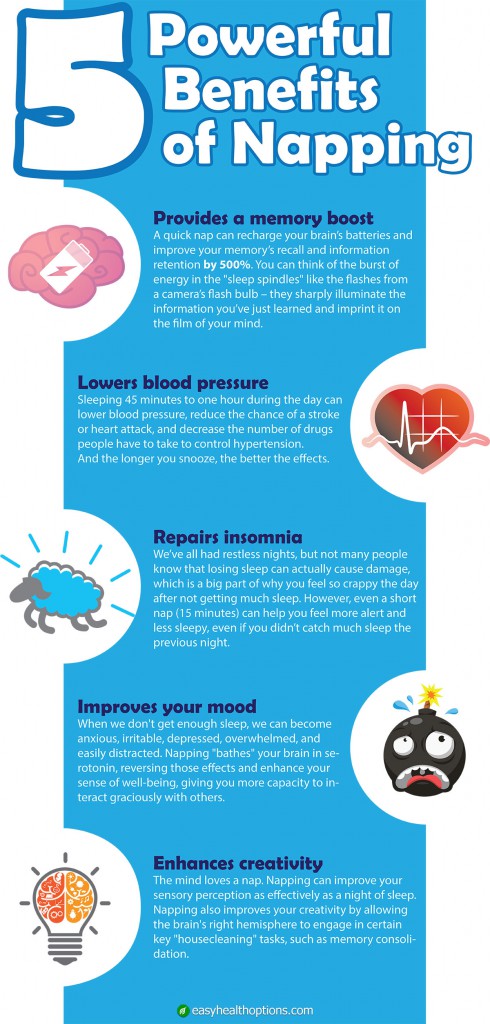Get Easy Health Digest™ in your inbox and don’t miss a thing when you subscribe today. Plus, get the free bonus report, Mother Nature’s Tips, Tricks and Remedies for Cholesterol, Blood Pressure & Blood Sugar as my way of saying welcome to the community!
5 powerful benefits of napping [infographic]
 Because our busy and technologically-dense modern lives have shortened our average night’s sleep by about two hours over the past 50 years, we are all at an increased risk of hypertension and cardiovascular problems linked to lifestyles with too little slumber.
Because our busy and technologically-dense modern lives have shortened our average night’s sleep by about two hours over the past 50 years, we are all at an increased risk of hypertension and cardiovascular problems linked to lifestyles with too little slumber.
Mid-afternoon napping is my frequent go-to strategy for getting my mental powers back when they start to get fuzzy. When my hours at my computer keyboard threaten to frazzle my thinking, I reach for whatever book I am currently reading (right now I’m in the middle of a book about the Civil War), stretch out on the couch and let the sentences on the page slowly lull me into slumber.
Unfortunately, many employers frown on employees napping at work. I think that’s a mistake – some of my best ideas come to me after a brief nap.
But if you are in a circumstance that allows you to nap, take advantage of the opportunity. It offers a wealth of refreshing possibilities.
Some people can fall asleep anywhere and at any time. But for the rest of us, it takes a little bit of composing ourselves to nod off.
Tips for napping
- Keep naps short. Aim to nap for only 10 to 30 minutes. The longer you nap, the more likely you are to feel groggy afterward.
- Take naps in the afternoon. Try to nap as close to the middle of the day as possible so it doesn’t disturb regular sleep.
- Create a restful environment. Make sure your feet and hands are warm. If they’re cold, it can prevent the nap. Also, reducing light and noise helps most people nod off faster.
(Hint: If you don’t want to nap a long time, set an alarm.)
You may also enjoy these articles on the benefits of a regular afternoon napping for your health:
Slumbering secret that boosts memory by 500%
In many ways, our ancestors’ lifestyle was more in tune with the human body’s natural rhythms. And research shows one important activity these folks used to recoup their mental and physical energy is still important today.
Great minds, healthy hearts take naps
Take a health tip from John F. Kennedy, Albert Einstein, Winston Churchill and Thomas Edison: Enjoy an afternoon nap. All of these men believed a daytime nap was a perfect way to re-energize and spark creativity.
A quick trick to improve your hormones
Many of us distort our hormonal health and immunity by getting too little sleep. But researchers in France say there’s a quick way to get those hormones back on track.
Sleepwalkers should take a nap
Research into sleepwalking shows that it may result when parts of your brain are asleep but other parts remain awake. As a result, sleepwalkers are usually sleepier during the day and many need extra rest to function at their best.












